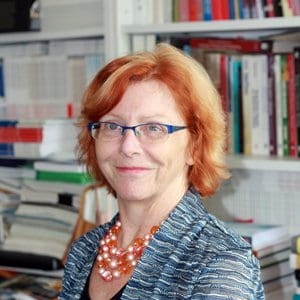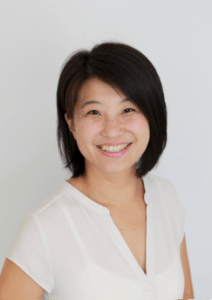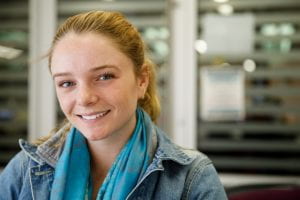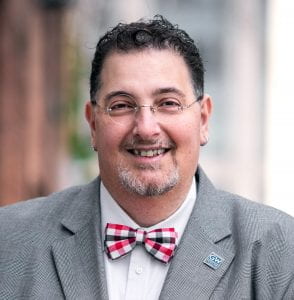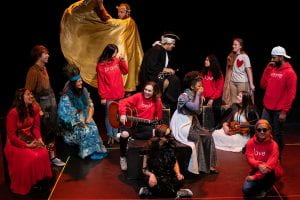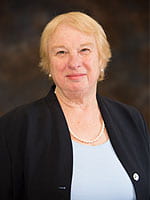Julia Storberg-Walker, associate professor at the Graduate School of Education and Human Development has been dedicated to community-engaged scholarship throughout her career. This can be seen in her recent article “Authentic Leadership in HRD – Identity Matter! Critical Explorations on Leading Authentically”. We are so proud of the community engaged scholarship of Dr. Storberg-Walker. Learn more about how Nashman supports community engaged faculty here. Want more information on getting your Community Engaged Scholarship course designated click here.
Category: Nashman Spotlights
Community Engaged Faculty: Hiromi Ishizawa
Hiromi Ishizawa, assistant professor of Sociology in the Columbian College of Arts and Science has continuously engaged with the community in her work. Recently, she published her work, “Civic Particiaption through Volunteerism among Youth across Immigrant Generations,” which analyzes trends in volunteering among different generations and ethnicities. We are so proud of the community engaged scholarship of Dr. Ishizawa. Learn more about how Nashman supports community engaged faculty here. Want more information on getting your Community Engaged Scholarship course designated click here.
Faculty Spotlight: Lottie Baker
Dr. Lottie Baker, assistant professor in the Graduate School of Education and Human Development recently published her work on service-learning and language in a classroom. Her piece “From learner to teacher assistant: Community-based service-learning in a dual-language classroom” displays extensive community-engaged scholarship on the topic of effective service-learning. We are so proud of the community engaged scholarship of Dr. Baker. Check out more of her work at this link. Learn more about how Nashman supports community engaged faculty here. Want more information on getting your Community Engaged Scholarship course designated click here.
Faculty Spotlight: Leslie Jacobson
Leslie Jacobson, professor emeritus of the Corcoran School of Art and Design, was recognized for her significant contributions to the Theatre & Dance Department ahead of her retirement in Spring 2019. Most notably, we are proud of the community engaged scholarship Leslie and her students completed as a part of the course she created, TRDA 3131W: Theatre for Social Change. Check out more of their work at this link. Learn more about how Nashman supports community engaged faculty here. Want more information on getting your Community Engaged Scholarship course designated click here. Click here for more information on the work of TRDA 3131W
Gabi Bello Discusses “The Climb is Our Story,” Zaniya Lewis’ 2019-2020 Knapp Fellowship, and her Civic Engagement
““The Climb Is Our Story” will provide college and career readiness skills to School Without Walls high school students who participate in the Multicultural Student Services Center student internship program. GW students will facilitate college and career readiness workshops with the assistance of the MSSC from September 2019 - May 2020.” For more information about The Climb is Our Story, please click here. ...continue reading "Gabi Bello Discusses “The Climb is Our Story,” Zaniya Lewis’ 2019-2020 Knapp Fellowship, and her Civic Engagement"
Faculty Spotlight: Dr. Leah Brooks
 Dr. Leah Brooks, Associate Professor of Public Policy and Public Affairs, centers her research on the formation of urban spaces, the continuation of urban development, the health of urban communities, and how governmental change affects urban areas. Areas of Dr. Brooks' expertise include, but are not limited to public and urban economics and political economy. A community engaged scholar recently interviewed Dr. Brooks to learn more about her work. ...continue reading "Faculty Spotlight: Dr. Leah Brooks"
Dr. Leah Brooks, Associate Professor of Public Policy and Public Affairs, centers her research on the formation of urban spaces, the continuation of urban development, the health of urban communities, and how governmental change affects urban areas. Areas of Dr. Brooks' expertise include, but are not limited to public and urban economics and political economy. A community engaged scholar recently interviewed Dr. Brooks to learn more about her work. ...continue reading "Faculty Spotlight: Dr. Leah Brooks"
Faculty Spotlight: Professor Steven Roberts
 There are “countless ways people associate with University and interact with this community. It is essential to have an obligation and to be good citizens in the surrounding community.” ...continue reading "Faculty Spotlight: Professor Steven Roberts"
There are “countless ways people associate with University and interact with this community. It is essential to have an obligation and to be good citizens in the surrounding community.” ...continue reading "Faculty Spotlight: Professor Steven Roberts"
Community Engaged Faculty, Dr. James Peterson
 Dr. James Peterson, Assistant Research Professor in the Department of Epidemiology and Biostatistics, advances analysis that integrates public health research and local communities. Dr. Peterson previously served as the Community Research Coordinator for District of Columbia Center for AIDS Research (DC CFAR) and currently serves as the Community Activities Coordinator for the DC Cohort Project, a city-wide HIV clinical research effort among 15 HIV care sites in the District of Columbia. For more information about DC CFAR, please click here. For more information about the DC Cohort Project, please click here. ...continue reading "Community Engaged Faculty, Dr. James Peterson"
Dr. James Peterson, Assistant Research Professor in the Department of Epidemiology and Biostatistics, advances analysis that integrates public health research and local communities. Dr. Peterson previously served as the Community Research Coordinator for District of Columbia Center for AIDS Research (DC CFAR) and currently serves as the Community Activities Coordinator for the DC Cohort Project, a city-wide HIV clinical research effort among 15 HIV care sites in the District of Columbia. For more information about DC CFAR, please click here. For more information about the DC Cohort Project, please click here. ...continue reading "Community Engaged Faculty, Dr. James Peterson"
Former Knapp Fellow Chloe King Named Marshall Scholar
We are so proud of GW Alumni and Knapp Fellow Chloe King who has been named a 2020 Marshall Scholar, making her just the fourth GW alumni to receive the scholarship.
King, who is currently in Indonesia for a Fulbright scholarship research project, will be able to pursue two master’s degrees at two different universities in the United Kingdom over a two-year period at no cost. You can read more about her future plans here.
While at GW, King was a recipient of the Knapp Fellowship. Read more about Chloe's work as a Knapp Fellow here here. We hope you'll consider applying for a Knapp Fellowship as well.
Faculty Spotlight: Nashman Affiliate Sangeeta Prasad
Academia too often focuses only on research, and community engaged scholarship allows people to rehumanize their fields and to consider the impact they could have in applying what they know, to the communities most in need in Washington, DC."
Professor Sangeeta Prasad, M.Ed, Psy.D., Nashman Center Affiliate Faculty and Adjunct Professor of Human Services and Social Justice, sat down to talk with us about her community engaged scholarship class, HSSJ 2170: Interpersonal relationships, which she has taught for the past four years. The class is a part of the Human Services and Social Justice department. It focuses on helping students better understand the dynamics of relationships, which they experience through the direct service they complete for the class. This semester, the class served with six different site partners, ranging from after-school programs to senior services.
Professor Prasad shared that she believes community-engaged scholarship is important because “Academia too often focuses only on research, and community engaged scholarship allows people to rehumanize their fields and to consider the impact they could have in applying what they know to the communities most in need in Washington, DC. In my sense, as somebody who moved here like many professors, we have a responsibility to the community in which we are living and to serve our students well… community engaged learning, I think forces us in a way to grow in our capacity to listen, to reflect, and to support our students.” ...continue reading "Faculty Spotlight: Nashman Affiliate Sangeeta Prasad"
Six GW Students Selected for the Annual Clinton Global Initiative University
This is a great opportunity for students and this year six GW students were selected to the program.
CGI U hosts an annual student meeting at different universities around the world to bring together students and national youth organizations to work together and find solutions to global issues.
Link here for a recent GW Today article, highlighting all six selected students.
Our Best to Sara Hooshangi, CPS
Dr. Sara Hooshangi is saying goodbye to GW after ten years as the inaugural director of the Integrated Information, Science and Technology (IIST) bachelor’s degree program
Dr. Hooshangi has been a friend of the Nashman Center and a champion of community engaged scholarship in the STEM fields. We will miss you Sara - all our best to you.
For more information, link here for the announcement in the College of Professional Studies newsletter.
Faculty Spotlight: Professor Lotrecchiano
An Interview with Dr. Lotrecchiano: “We need teams because we can’t solve problems alone. This brings diversity to the table to solve wicked problems.”
Professor Lotrecchiano’s courses highlight the importance of diverse perspectives and revolutionize concepts of interdisciplinary collaboration. ...continue reading "Faculty Spotlight: Professor Lotrecchiano"
GW Corcoran Visiting Professor Molly Sturgis Upcoming Performance: “Waking the Oracle”
Molly Sturges is this year’s Corcoran Visiting Professor for Community Engagement. She adapted one of her pieces called “Waking the Oracle,” for the GW community. It is described as “A multi-arts rave focusing on arts, spirituality, and climate justice.”
The show will run October 31-November 3 in the Black Box theater in Building XX. Buy tickets here.
Faculty Spotlight: Professor Joyce Pulcini
Professor Pulcini, a Professor of Nursing, was the Director of Community and Global Initiatives and served as the Chair of the Acute & Chronic Care Faculty Community. Maureen Albero, a Community Engaged Scholar at the Nashman Center, interviewed Professor Pulcini to learn more about her work.
Professor Pulcini has been with GW for seven and a half years and has been expanding international opportunities for Nursing students. Professor Pulcini’s dedication to local and global public health manifests in her research and initiatives. Locally, from the PCORI Grant, Professor Pulcini has been able “to research asthma barriers in children with special needs.” The PCORI Grant also allowed Professor Pulcini and her collaborators to focus her research in Washington, DC, Iowa, and Washington State. In DC, Professor Pulcini worked with “nurses and parents in schools to create a community engaged design study that focused on children with special needs and asthma.”
Professor Pulcini teaches and participates in a Community Health, a course at GW that is required for Nursing students. As a requirement in this course, students may go to either Haiti, Ecuador, Costa Rica, or Uganda for one week. In this one week, students are totally immersed in this community as they do 40-50 hours of service. Professor Pulcini asserts that “the goal in this course is for students to have a community health experience.” This one week abroad “satisfies a major portion of the clinical component of Community Health by providing healthcare, treatment, and education abroad.” Professor Pulcini noted that “Carol Lang, the current Director of Community and Global Initiatives, is working to expand the program to include Slovenia.”
Professor Pulcini noted that in recent trips to “Uganda and Haiti, students worked with community workers to teach community members about hypertension.” In Haiti, “students worked with mothers and children susceptible to anemia and parasitic diseases.” Professor Pulcini found this work in Haiti to be very intriguing as community members asked the facutly, and students, “to teach the community at large about anemia in hopes to implement preventative measures.” To maintain these global partnerships, new students in Community Health and experienced faculty members visit the same sites each year. To note, Community Health is offered every semester.
While students learn a tremendous amount about local and global public health from this experience, students also benefit in other less obvious ways. “After living in an under resourced part of the world,” Professor Pulcini has seen “students change the direction of their academic study, pursue higher degrees in public health, and work internationally.” When asked about her favorite student story, Professor Pulcini recounted a memorable student experience, “this student earned their doctorate in Global Health from Duke University and continued their post-doctorate fellowship at Harvard. Now, this student focuses their work on tuberculosis in South Africa.” From the student’s experience in Community Health, they were inspired to “center their career in International Health.”
Professor Pulcini encourages all students to take a service learning course because “you will learn so much about the community and world.”

